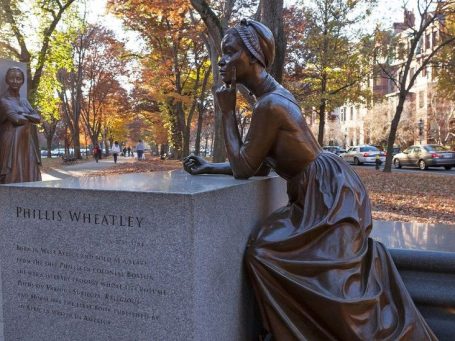Phylis Wheatley
The First Published African American
Born in Africa, Phillis Wheatley was captured and sold into slavery as a child. She was purchased by John Wheatley of Boston in 1761. The Wheatleys soon recognized Phillis’s intelligence and taught her to read and write. In October 1772, Thomas Woolridge, the Earl of Dartmouth, asked her to write a poem. Entitled "To the Right Honourable William, Earl of Dartmouth," the poem reflects the colonists’ hopes that Dartmouth would be less tyrannical than his predecessor. Wheatley then declares that her love of freedom comes from being a slave and describes being kidnapped from her parents, comparing the colonies’ relationship with England to a slave’s relationship with a slave holder:
Should you, my lord, while you peruse my song,
Wonder from whence my love of Freedom sprung,
Whence flow these wishes for the common good,
By feeling hearts alone best understood,
I, young in life, by seeming cruel fate
Was snatch’d from Afric’s fancy’d happy seat:
What pangs excruciating must molest,
What sorrows labour in my parent’s breast?
Steel’d was that soul and by no misery mov’d
That from a father seiz’d his babe belov’d:
Such, such my case. And can I then but pray
Others may never feel tyrannic sway?
All this was done while still enslaved and at the young age of 12 yrs. old
We need your consent to load the translations
We use a third-party service to translate the website content that may collect data about your activity. Please review the details and accept the service to view the translations.



